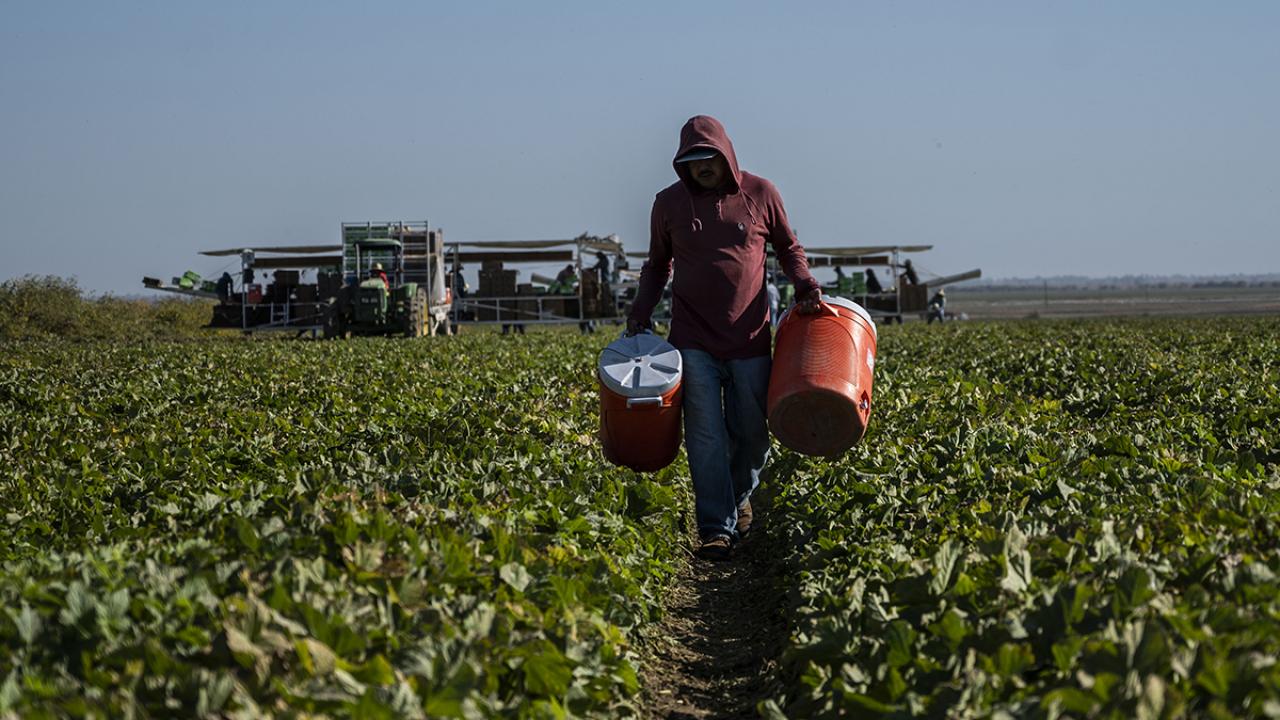
Research Highlight
Stressors and Psychological Distress of Latino Immigrant Agricultural Workers in California
PI Dr. Alvaro Medel-Herrero and his research team received funding from the WCAHS Small Grant Program in 2018.
Stress has been identified as a significant predictor of poor physical and mental health. Psychological distress increases alcohol/substance abuse, psychiatric conditions and suicide rates, as well as health issues related to hypertension and cardiovascular disease. Agricultural workers experience high rates of stress-related psychiatric conditions and one of the highest suicide rates of any industry and yet the stressors and mental health of this population are not well understood.
California was particularly harmed by the 2007 recession, and minorities as well as vulnerable underserved communities suffered disproportionately. Observational studies show an association between economic downturn and poor mental health outcomes. These problems have continued well past the end of the recession.
In 2016, Kaiser Health News noted a dramatic increase in the number of California psychiatric hospitalizations beginning in 2007 . The growing trend was particularly pronounced in California's Central Valley (Colusa, Sutter, Stanislaus, Fresno, and Tulare counties), an area widely characterized by agricultural work and a large Latino population. In addition, the immigration policy of the Trump administration is expected to have a devastating impact on the battered mental health and determinate most recent trends on stress in this vulnerable population.
This study aimed to investigate psychological distress and identify relevant stressors by conducting in-person interviews and focus groups, gathering information from 200 participants, over the course of 6 months (April–September 2019). Topics of interest included prevalence of psychiatric disease (e.g. depression, anxiety), mental health services utilization, alcohol intake, and loneliness in documented and undocumented Latino immigrant agricultural workers in California.
Preliminary Findings
Results showed that study participants experienced an array of stressors related to the seasonality of the work, language difficulties, poverty, exploitation, low salaries, and the economic difficulties and uncertainties associated with agricultural activity, including job insecurity.
Physically demanding work and a potentially dangerous physical environment were also of great concern and noted as a source of stress. Focus group participants shared personal experiences and examples of extreme situations to illustrate the working conditions of agricultural workers. For example, in different focus groups (conducted in San Joaquin Valley), some of the workers said that planes fumigated the fields while they worked exposing them to chemicals. Exhaustive working hours from Monday to Saturday, lack of free time, and the inability to spend time caring for children and their families also constitute recurring self-reported causes of stress.
Another major cause of stress was the participants’ vulnerability to abusive practices, including dishonest or fraudulent behavior by owners/supervisors. For example, participants in focus groups repeatedly complained about the payments they must make to their supervisor or “patrón” in order to get work tasks that require less physical effort. The inability to defend their rights and avoid abuse (they argue they are fired when they complain) were repeatedly stated in focus groups as a cause of stress.
Farm work is associated with a unique set of characteristics which are potentially hazardous to mental health. Difficult living and working conditions make this population vulnerable to stress and stress-related mental health conditions. The research team found that these stressors vary depending on legal status—particularly on whether individuals are documented or undocumented. Separation from families, migration, legal status concerns, and fear of potential deportation, as well as racism, were also reiterated as an increasing concern that contributes to psychological distress. The immigration policy of the Trump administration was identified in the focus groups as a major cause of stress and social exclusion in the agricultural population.
Next Steps
Findings from the focus groups and interviews will continue to be analyzed and published. Stress, psychological distress, and access/utilization of mental health services in Latino immigrant farmworkers in California will be compared to that of the general California population. Preliminary analysis indicates that the access to and utilization of mental health services are very low in the farmworker population, yet they appear to suffer from high rates of mental health issues.
Results from this study contributed to identifying new directions and issues of potentially great impact. Based on feedback from the focus groups, the study team applied for and received another small grant award from WCAHS this year for a pilot study entitled, “Policies of exclusion: Understanding the impact of the current immigration policy on self-reported health, healthcare access and participation in public programs among California hired Mexican agricultural workers and their families.” This study aims to explore and measure the impact of the current immigration policy on Latino immigrant farmworkers, including the potential impact on healthcare services utilization and participation in public programs.
